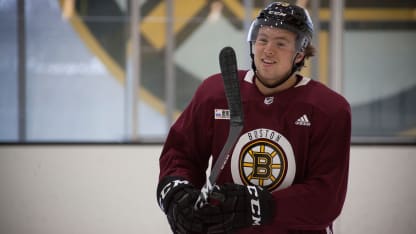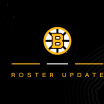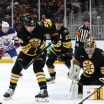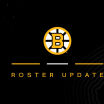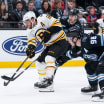BOSTON - Charlie McAvoy was not quite sure what to think. As he sat on the Bruins bench during the third period of the team's game with the Edmonton Oilers in late November, the rookie blue liner's heart was racing.
It was not the first time he had experienced such symptoms, but it was far more pronounced this time around, making it hard for the then-19-year-old to focus, much less play a hockey game.
"I'm trying to figure out what's going on. It's something that I can't play with when I have it," said McAvoy. "I can't be in the middle of an episode and mentally be attentive to the hockey game. I'm more worried about my heart getting back to normal. That night was a little bit scary."
McAvoy Gets Back to Work Following Procedure
Rookie blue liner skated for first time since ablation
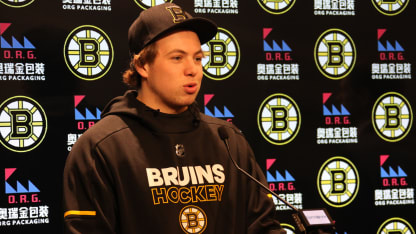
By
Eric Russo
BostonBruins.com
When the game ended, McAvoy went straight to team internist Dr. David Finn and head trainer Don DelNegro and explained what he was feeling. A follow-up appointment was quickly scheduled, where the Long Beach, N.Y., native was diagnosed with an abnormal heart rhythm (supraventricular tachycardia) - a treatable condition that was not harmful to his health.
It was a comforting and reassuring development.
"I think it was relief, first off, to find out that it was not life-threatening and not dangerous to my overall health. That was my best takeaway from that…[at first] I'm kind of nervous that this is going to be something that is really bad, that I might not be able to play again," McAvoy said Monday afternoon during a press conference with Finn and Bruins general manager Don Sweeney at Warrior Ice Arena.
"To find out that it was something that was not dangerous, not life-threatening, something that I could still continue to play with, that was a good takeaway right away from the overall situation."
McAvoy and the Bruins were assured that the first-year defenseman - a leading candidate to take home the Calder Trophy as the league's best rookie - was not at risk to continue playing. He went on to register a two-point game (goal, assist) in the first contest after the episode - a 3-2 victory over the Lightning.
Overall, he suited up for 23 games - all while never playing less than 18 minutes, 31 seconds - before undergoing an ablation procedure to correct the abnormal heart rhythm on Jan. 22.
"Charlie was 19 at the time. My boys are 19; that's the first thing that goes through your mind," said Sweeney. "Fortunately, as I said, the medical staff was very definitive in their diagnosis…I think we felt very comfortable. Clearly, we needed to be 100 percent sure that Charlie was able to play and it was at zero risk. His family is involved in all the decisions.
"Charlie was good mentally and physically through this whole process. That is what's probably been one of the most amazing things is how well he has handled it knowing that this was on deck and going out and playing at the level he was. It says a lot about him."
McAvoy potted 3 goals to go along with 11 assists during the 23-game stretch ahead of the procedure and remained far and away the league leader in time on ice among rookies. The 20-year-old is averaging 22:48 over 45 games, more than two minutes ahead of Philadelphia's Robert Hagg (18:14).
"The likelihood of it happening again was there, and that is something that kind of sticks with you, but at the same time I was trying not to think about it too much obviously knowing that it wasn't dangerous, wasn't life threatening, so if it were to come back, I know I'd be fine," said McAvoy.
"We kind of talked about a little strategy if it did come back - remove myself from the game and allow myself time to get my heart back and feel good. Luckily, we didn't get to that point."
According to Finn, the procedure required a catheter to be inserted into the lower abdomen and up to the heart to "isolate the bundle of electrical tissue that creates this abnormal heart rhythm."
"They're able to find that and basically ablate it. They can destroy the extra tissue there, and once it's gone, it doesn't come back again," added Finn, who also said the condition can be triggered by exercise or adrenaline surges - including from consuming caffeine - and is not considered hereditary.
Following the ablation, the team announced that McAvoy's expected recovery time was two weeks. He is currently at the one-week mark and did some light skating for the first time on Monday before the Bruins' full team practice in Brighton.
"I had basically a week of nothing," said McAvoy. "I was told to kind of just sit around and make sure that I'm not exerting myself in any way that is going to disrupt my first week of recovery…today, I'm back here back at the rink, and we'll be able to start doing some stuff."
McAvoy will progress to the next steps in his rehab based on how he is feeling.
"We have a strategy for getting back up to speed, and I feel comfortable with it, starting with today being the first day," he said. "We're going to go at it with open communication, with Doc [Finn], the doctors at MGH, [DelNegro], obviously everyone involved. I'm not afraid to tell them exactly how I feel - if I'm ready, if I'm not - and we'll go about it together."
The timing of the procedure allowed McAvoy the luxury of the All-Star Break, which helped minimize the amount of games he would miss, which at this point has been only two.
"To get it done now, now I can go through not only sports, but life and I won't have to worry about it ever again," said McAvoy."Even with the bye week, still would've been missing games, so we decided that this was a good time. It matched up well with the doctors and their availability to have a full staff there. I think we chose a great time to do it."
McAvoy said once he is feeling good enough to return to game action it will be up to Bruce Cassidy and his staff to determine how much he plays. The rookie, however, does not expect to feel any differently.
"I have no reason to think that I would come back different. I think maybe just some time, some extra time to get back, but I'm still the same person," said McAvoy. "I'm one week removed. I feel good…we'll get back on the ice and see how things are going. When the time is right, I'll get back out there."
For now, McAvoy's teammates are more than pleased just to have him back around the rink.
"Very, very nice," Bruins captain Zdeno Chara said of his defense partner. "Any time you see a player coming back from any kind of procedure, especially what he played through, it's a huge boost for the team. You could tell that he was happy as well. Hopefully he's back playing with us soon.
"He's a player that made a big impact on us, last year in the playoffs and obviously this season….first and foremost we hope he can be fully recovered and be back to normal."
